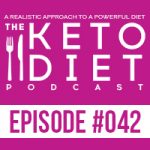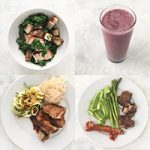I want...
The Keto Diet Podcast Ep. #048: Overcoming Amenorrhea on Keto
August 27, 2017 By
Leanne Vogel

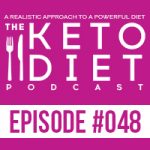 December 10, 2018
December 10, 2018
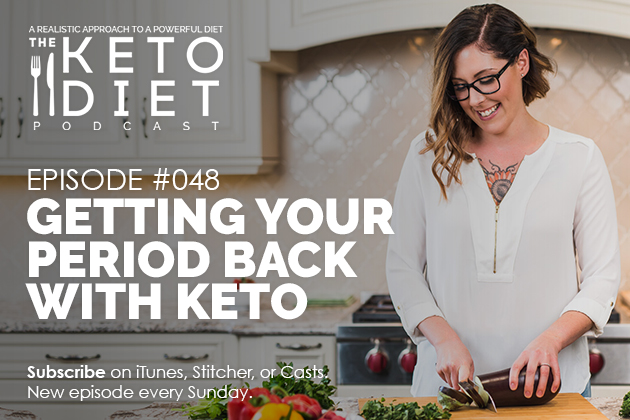
Interview with Kalli Youngstrom, IFBB figure pro, elite level powerlifter, and lifestyle coach, chatting about why we want a period, steps she took to get her period back after being a competitive athlete, training and amenorrhea, weight gain to get your period back, and so much more.
I went without my period for 8 years, and throughout that struggle, I was told by multiple health professionals that I would never get it back. Because I wasn’t trying to get pregnant, my doctors didn’t see my lack of period as a pressing issue, which is ironic because a regular period is just one biomarker of overall health. I believed that amenorrhea would be a lifelong battle for me until I found keto … and got my period back. We’ve talked before about Optimizing Your Menstrual Cycle on Keto, so if you’re struggling to regulate your period, that episode might be a great resource for you. If you need something further, Kalli and I have your back.
In today’s podcast, we’re chatting about what you can do if you find yourself struggling with amenorrhea, including why menstrual health is so important and what role keto can play in that health. Today’s interview is with Kalli Youngstrom, who has faced an amenorrhea battle firsthand and won with the help of keto.
We broke down the causes of amenorrhea, talked about our personal experiences, and shared actionable steps that you can take to join us on the other side.
Let’s get to the interview!
For podcast transcript, scroll down.
Show Notes & Links
- Feel awesome on your keto diet with The Keto Bundle
- Try my free 7-day keto meal plan
- Subscribe on iTunes or your favorite podcast app
- RSVP for the Fall Book Tour today
- Check out more from Kalli on her website and follow her on Instagram
Timestamps
- Everything amenorrhea, a lack of period (06:48)
- Getting your period back (14:38)
- Do you have to gain weight to get your period back? (32:27)
Partners of The Keto Diet Podcast

I love starting my day off with a Rocket Fuel Latte, and an RFL just wouldn’t be the same without Manitoba Harvest hemp hearts! Get 15% off your Canadian or US based Manitoba Harvest order with the coupon code KETO, now through December 31, 2017.
100% grass-fed & finished FERMENTED beef sticks with 1 billion naturally-occurring, gut-healing probiotics! Go to Paleovalley.com for 20% off.
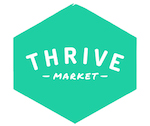
Thrive Market 35% savings – get an instant 35% off your favorite premium organic products. All you have to do is enter your email address, and the discount will be applied to your cart!
Transcript
Leanne Vogel: You’re listening to Episode Number 48 of The Keto Diet Podcast. Today we’re chatting about everything amenorrhea – a lack of period – the steps you could take to get your period back if it’s gone missing, and whether or not you have to gain weight in order to get your period back, plus so much more, so stay tuned.
Hey, I’m Leanne from HealthfulPursuit.com and this is The Keto Diet Podcast where we’re busting through the restrictive mentality of a traditional ketogenic diet to uncover the life you crave. What’s keto? Keto is a low carb high fat diet where we’re switching from a sugar burning state to becoming fat burning machines.
All listeners of the podcast receive a free seven-day keto meal plan complete with a shopping list and everything you need to chow down on keto for seven whole days. Download your free copy at HealthfulPursuit.com/ketomeal. The link will also be in the show notes for today’s episode. Perfect if your daily keto meals have become a bit lackluster, if you’re new to keto and a bit lost when it comes to eating what and how much, or thrive on being guided on what to do and when to do it. Again, that’s healthfulpursuit.com/ketomeal. Let’s get this party started.
Hey guys, happy Sunday. The show notes and full transcript for today’s episode can be found at HealthfulPursuit.com/podcast/e48. The transcript is added to the post about 3-5 days following the initial air date of this episode. All of the links and everything we talk about with today’s guest will be in those show notes. Let’s hear from one of our awesome partners.
The podcast is sponsored by Manitoba Harvest, the hemp-based food company. I love using their hemp hearts as an oat replacement in any oat-based recipe from porridge, to oatmeal, cookies and everything in between. Hemp hearts are hemp seeds with the shells removed. They’re tender, fatty, zero grams of net carbs, rich in omegas, fiber and protein. Listeners of the podcast can get 15% off your Canadian or U.S. based Manitoba Harvest order by going to HealthfulPursuit.com/hemp and using the coupon code KETO. That’s KETO, all in caps, no spaces, for 15% off. This offer is valid until December 31, 2017. I know you’re going to love them.
If you have an idea for a podcast episode or want to submit praise over and above the review, which you can leave by going to HealthfulPursuit.com/review, you can reach me at info@ketodietpodcast.com.
I got one announcement for you guys. I’m going back on tour. I’ve been sharing it with you guys for a couple of months, and I actually start the tour tomorrow. We’re going to start off in New York, and then head on over to Fairfax, Virginia, stopover in Dallas, I’m going to be at Keto Con doing a couple of talks there in Austin, heading over to Denver and Phoenix and Las Vegas. We’re really excited to go back to Vegas because Kevin proposed to me in Vegas a bunch of years ago and we haven’t been back since. Even though we’re only going to be there for like 20 hours, it’ll still be fun to reminisce about that time.
We’re also going to head to Los Angeles, then we’re going to cut over to Canada and go to Winnipeg, Ottawa, and Montreal. You can head on over to ketodietbook.com/tour to RSVP. If you’re thinking of going to any of these places and meeting me there, I’d love to meet you there and sign your book and we’ll chat, I’ll answer all your questions, it’ll be great.
Today’s guest, her name is Kalli Youngstrom. She’s an IFBB Figure Pro, an elite level power lifter, and above all else, a lifestyle coach. Kalli focuses on enhancing health, fitness, physique and performance, while helping you reach your goals by creating custom programming designed specifically for you. As a certified personal trainer, weight management specialist, and sports nutritionist, she uses her know edge and experience in body building and athletics, along with clients’ personal bio feedback to optimize results, and this often means a low-carb, high fat and/or ketogenic diet.
I’ve been following Kalli for quite some time. I just love the message she has out there and it just so happens that she struggled with amenorrhea for a bunch of years and I wanted to just have her on the show to chat about her experience of going through amenorrhea. If you’re not familiar, amenorrhea is a lack of a period. This is usually where there’s two different forms of amenorrhea. The first is where you never get your period, and the other one, it’s phase two, is more you get your period, and then it goes missing for a while, so this means you’ve already menstruated one time in your life. I think it’s a minimum of three times, and then it’s phase two amenorrhea. In any case, your period is missing, you’re wondering where it went, and we just go through her experience of that.
My experience is very similar to Kalli’s, which is really cool to hear her story. Although I am nowhere close to being a figure pro, my experience with amenorrhea was very similar in that once I committed to getting my period back, it actually didn’t take that long. I was really lying to myself all those years that I thought that I was working on it, but I didn’t want to give up exercising or eat when I wanted to eat, and there were still a lot of rules around it. Without further ado, let’s cut over to her interview.
Hey Kalli, how’s it going?
Kalli Youngstrom: Hi Leanne, good thanks. How are you?
Leanne Vogel: I’m so good. I’ve been following you on Instagram for forever, and I’m really excited to have you on the show.
Kalli Youngstrom: I’ve been internet stalking you forever, so thank you for having me. It’s like a huge compliment to talk to you. You’re the person I followed since I first found Keto I think, so …
Leanne Vogel: So cool. For listeners that may not be familiar with your work, why don’t you tell us a little bit about yourself.
Kalli Youngstrom: I own KY Fitness and Nutrition Consulting. Basically it’s online, nutrition consulting and custom fitness plans as well. I started off in fitness as a professional body builder, a figure competitor. That’s kind of how I found the whole fitness thing. I started implementing different diet methods, just playing around with things and eventually found keto I think in like 2013, I first started playing around with keto. I was fairly young still. I remember just munching on almonds always in my finals and not eating carbs. Everyone thought I was crazy.
Yeah, so through just myself and other clients, I’ve just always experimented with different methods, and I really come to think keto is a very good option for the majority of people.
Leanne Vogel: I agree. For those that resonate with it, it’s so great.
Menstruation … I want to chat about amenorrhea with you. What was it like? As a figure competitor, is that why you lost your period because of your body fat percentage? What was that process of having your period and then not having it anymore?
Kalli Youngstrom: I didn’t have a period for five years, which is a long time. I would have been 21 I think when I first lost my period, I’m 26 now. I mean, I know you didn’t have it for a long time. At that age, honestly, I was so focused on competing that it didn’t negatively affect me mentally. I knew it wasn’t necessarily a good sign, but it does happen, and like you said, yeah, it was just because I was so lean and my body was just under so much stress. Hours of cardio a day on a really large calorie deficit, just putting my body through a lot.
When I very first lost it, I think probably six months without it, I did go to the doctor and I got an ultrasound and just kind of got everything checked out, and they just kind of did the, oh you know, “If you’re not trying to get pregnant, it’s like, everything looks fine, so …” send you on your way. Then I just was so focused on having to keep my physique that lean that it was in the back of my head, but I knew it wasn’t a good sign for my overall health, but I was willing to sacrifice that at the time. Then I stopped competing in November, and was like okay, now it’s time to focus on my internal everything. If eventually down the road, I’m going to have babies, we need to make sure everything’s healthy because I do think, and I know you talked about this as well, anytime a natural process like that stops, it’s a sign that something’s not working.
Leanne Vogel: Especially women, period. If your period stops, danger, danger, we have a problem.
Kalli Youngstrom: Yeah, exactly. I actually think that I feel like I have. I as a coach, with clients who some are trying to get that lean for competitive reasons, I always try to prioritize keeping hormones healthy and ensuring that menstruation still happens. Some women are more sensitive, I feel like, to the stress and lose it at a higher body fat percentage than you would expect, and I’m always kind of surprised how lightly the doctors take it. No one really seems worried, and I think it’s kind of like, they don’t want to dig and they don’t really want to deal with it if it’s not causing immediate problems.
Leanne Vogel: Yes, sister, 100%. That was my experience.
Kalli Youngstrom: Like, sweep it under the rug.
Leanne Vogel: When you were younger, when you said you lost yours, early 20s, same with me, it’s like, okay great. It didn’t even occur to me that it was a problem. It was kind of nice to not have a period I mean, I didn’t have to worry about anything. I saved money.
Kalli Youngstrom: Yeah, you’re like, “What a convenience.”
Leanne Vogel: “This is so great.” But then for you, at what point did you start caring, when you were like, oh shoot, maybe this is important?
Kalli Youngstrom: I would say for the last couple of years, the last year especially, it was really in my mind quite frequently. I was kind of like, I’m competing right now, I’m going to focus on that, and I’ll focus on everything else when I’m done competing. That’s kind of the thing, I know not everyone can maybe relate with body building, but you just have to have tunnel vision, to be honest, to be successful. Because I had made the pro level, I was like, “It’s worth the sacrifices that I’m making.” I was always really open, all my social media and my YouTube channel and everything talking about how I’m sacrificing my health and I know that.
Probably the last year I was concerned about it, but putting it on the back burner to actually deal with it. Then come November, December, that’s when I was like, “Okay, now it’s time to fully embrace the need to get it back and focus on that.”
Leanne Vogel: What were those steps like? Once you decided, Okay, this girl’s got to focus on her menstruation. What were you doing at that point? It sounds like you were already doing keto, or weren’t?
Kalli Youngstrom: I’ve done it on and off since 2013. The thing that’s so counterintuitive is that I always preferred it, but when I was getting ready for a show, I would go off of keto. I would eat carbs to make my muscles look more full on stage. I felt like garbage because I was eating carbs. I also competed in world power lifting. I would hate eating carbs before training, but I would eat carbs because that’s what you’re supposed to do, that’s how you’re supposed to have heavy training sessions.
I had been doing, I wasn’t doing full keto, but I would say almost like a targeted keto, carbs just pre and maybe post workout, or even only pre workout, but very small amounts, like 25 grams other than veggies in a day, so still super low, but not fully in ketosis. By the end of November when I was done with competing, I knew instantly that I would go back to keto. I always go back to it just because I just feel like I can function like a human. On carbs, I never feel that way and that’s the thing. When I first fell into keto, I was not even necessarily aware that’s what I was doing. I was just eating what I preferred and what made me feel good, and then I started learning more about these are the things that other people are doing and these are the macronutrient ratios.
By December and then into January, I was basically fully, I went through a period transitioning from low carb then, to just like paleo, fully and not tracking, and then fully into keto. Now, I mean, I’ve always known that this is how I will probably live forever, once I was done competing. I’m excited to be able to just stay in keto zone.
Leanne Vogel: You’ll never compete again or just for now, or kind of have you … what’s your plan?
Kalli Youngstrom: No I’m done. I’m retired.
Leanne Vogel: Yeah, yeah. Cool. I’m always so curious, I rarely get to speak to somebody that’s on the other side of it. Usually you meet people that are right in it. You’re right, that tunnel vision, it’s required. You can’t think of anything else. I guess it’s very much like any athlete or when you’re really, really applying yourself to basically anything if it’s required in order to … It’s nice that now you can kind of do the things you know makes your body feel good.
More on my interview with Kalli Youngstrom after this message from one of our podcast partners.
The show is partnered up with Paleovalley, the makers of the only 100% grass-fed and finished fermented beef stick. Each stick contains 1 billion probiotic CFUs. We all know how important fermented foods are to the health of our gut and the strength of our immune system. Chowing down on Paleovalley’s fermented beef sticks provides your body with all of the beneficial bacteria it loves in one convenient little beef stick. Their gut-friendly sticks are gluten-free, soy-free, dairy-free, GMO-free, freaky chemical additive, dye, and preservative free, as well as being 100% free from carbs and sugar, and made with the highest quality ingredients.
Exclusive to listeners of this show receive instant savings of 20% off Paleovalley fermented beef stick snacks by going to Paleovalley.com/keto. And if your jaw is just tired thinking about beef jerky, it’s worth noting that these tasty treats are not tough at all, but moist with a little snap. The summer sausage flavor even tastes like those Hickory summer sausages, but without the gunk. Seriously delicious. Again that’s Paleovalley.com/keto for an instant 20% off savings.
By the time you decided, I want to make my body feel good, how long between that point and getting your period back, how was the process? How long did it take?
Kalli Youngstrom: I was actually quite shocked how quickly it happened. I almost feel guilty saying that because I know some women, it’s months and months, or years to recover it, so I feel very grateful. It’s one of those things you almost take for granted. There’s other people who are struggling with it, but I had switched over to keto and did basically fully untracked, being in a calorie surplus, or at least at maintenance the majority of the time. It was five months.
Leanne Vogel: Whoa.
Kalli Youngstrom: Yeah. I was honestly shocked. I had no PMS symptoms, zero sign, I was like, “What’s happening?” It’s only been three months actually, to share with everybody, but my cycle was just completely normal since then. I thought it would be all messed up and slowly get back into a routine, but I got it one month and then it just, for the last three months, it’s been completely normal, it’s wild.
Leanne Vogel: I have so many questions for you. Let’s start off with, okay, I’m going to write down a bunch of things. The only thing you did was a calorie surplus or did you also reduce your amount of workouts?
Kalli Youngstrom: That is a good point. I drastically reduced the amount of workouts. I mean, really for me, I would have been in a massive calorie surplus, because I went from doing multiple hours of cardio a day. I kind of slowly tapered it back, and then I got to a point where I just kind of cut it out completely. I took some time off training for the first time in like five years. I took basically a month off training and was just eating all of the food, and then slowly started ramping back up.
When I got my period back, I had been training like regular training sessions and cardio sessions again. Not as much cardio, but 5-6 days lifting with probably half an hour of cardio a day at the time that I got my period back.
Leanne Vogel: My calculating out how long it took me from the time that I really focused my attention and stopped working out and ate all the foods, it was five months for me too.
Kalli Youngstrom: Oh wow, that’s crazy. Do you know what though? I feel like that’s so funny because I often hear people say that it takes six months for your hormones to recover.
Leanne Vogel: Brilliant.
Kalli Youngstrom: I mean, it just anecdotally, I think from forums and stuff. So yeah, I guess that ballpark. That’s the thing, I kind of did just cold turkey almost. I was like, “I’m going to eat all the calories, I’m going to cut back on my training.” I didn’t just slowly transition over to that, for me it was like quite a dramatic change.
Leanne Vogel: What’d you do with all the extra time of not going to the gym and stuff? This was your life for years. How did you deal with that change? I mean it has nothing to do with your period, but I’m just curious.
Kalli Youngstrom: Just working. I was pretty burnt out. I needed, because for five years, I never took more than two days off the gym. I didn’t take any years off competing for four years. It was just very go, go, go. I honestly just worked, I slept in a little bit. I just, that’s one thing that changed – if I would have slept a little bit more too, just naturally, because I wasn’t getting up to do cardio first thing in the morning. Even little things like playing around with recipes, I don’t know, and being social, which doesn’t really happen when you’re competing so much. It was nice to have the extra time.
Leanne Vogel: Yeah, I feel you. Anytime my period is like a day late, it’s usually because I have been stressing myself out at work. All I do is lay on the couch and watch Netflix, and the next morning, I get it. It’s just like, you just need to take a pause.
Kalli Youngstrom: It’s crazy, your body just knows.
Leanne Vogel: Yeah, it just knows. “Nope, I’m not doing this.” So then it’s like, Netflix hour, and I just watch Netflix all night, and then I get my period the next day, it’s really nice. Okay, so then I have a question about, so you did this for five months, did you do strict keto? What did your kind of keto look like for those five months when you were trying to get your period back?
Kalli Youngstrom: I mean, I guess it depends what you classify as “strict.” I do whole foods keto. I don’t do dairy, I will do dairy on the weekends maybe if I’m eating out kind of thing. I found I’m really sensitive to whey, so I didn’t really realize I was breaking out and I didn’t know why. Then I cut whey and dairy and stopped breaking out, so now I really try to stay away from that. Mostly whole foods like unprocessed stuff. I even cut all my supplements. I don’t do any supplements. No BCAAs, no powders, just nothing. I just cut everything out and do only whole foods.
I cut basically all my artificial sweeteners as well. I’ll do like a little bit off stevia in a keto coffee or something, but I’ve never been super, super strict in terms of macro ratios. For me, I just feel like I don’t need to to maintain ketosis and to feel really good. For example, I never track vegetables, and I’ve always just stayed in ketosis. I just know I will never live a life where for me, I need to track salads every day. It’s just not realistic for me.
I’ve never been super strict in terms of like, I want to make sure I get 150 grams of fat, or whatever number, exactly on the dot. I kind of stay within a range of my macros. It kind of just naturally ends up in that range every day because I only eat a couple of meals, and just how I base those meals on whole foods, the macros kind of work themselves out if that makes sense.
Leanne Vogel: It totally makes sense. Trying to explain that to people is the hardest thing to do because it’s like, “No, just trust, it’ll just work out.” People are like, “No, but what numbers?” I’m like, “Just do it. You’ll see, it’ll just work out.”
Kalli Youngstrom: Yeah, and getting out of that tracking mindset. That’s the thing, once you get into ketosis, I feel like you and probably me and the majority of people, you start realizing you recognize your hunger cues again and all of these things that, when you’re used to a more carb-based diet and especially tracking, I think tracking can be the worst for your natural hunger mechanism because you are just eating when you’re supposed to or you are eating the numbers you’re supposed to, not eating based on how you feel. It’s normal for us to have days where we eat more and days where we eat less. If you’re tracking a certain number all the time, then you never have that ebb and flow.
Leanne Vogel: We get asked a lot of questions about calories and, what’s kind of, do you work with clients on their nutrition specifically? Do you some of the people that you work with have amenorrhea, and how do you navigate that with intake and training and all those things?
Kalli Youngstrom: I have had probably four or five clients now who we’ve recovered their periods using keto. Again, I don’t want to say it was only keto. I know there’s always a variety of factors, some of them being trying to get them out of a calorie deficit. Usually what I will do toward keto is because lots of clients come to me and they want a plan because they don’t want to figure it out on their own. They don’t want to track macros or just worry about it. What I’ll usually do on a keto plan is give a meal plan, and then give them macros for those meals and try and encourage them to be flexible with them with whole foods.
Swapping fatty proteins for fatty proteins, or instead of a fatty protein, bring in a lean protein, an alternate fat source. Give them that variety. I think that’s how you really learn to love keto is when you’re eating all these amazing foods and understanding how versatile it can be. Yeah, giving them a diet high in healthy whole food fats, and then also trying to get them into at least a maintenance calorie place, slowly, but it can be hard when people are very focused on maintaining a certain physique.
For some people, I would slowly, I call it reverse dieting, where I would slowly increase their calories back up and decrease their training, which might draw out the recovery process in terms of recovering the period a little bit longer, but keep them in a better mental state and keep their cortisol low in that aspect.
Leanne Vogel: Yeah, yeah. That reverse dieting is so important.
Kalli Youngstrom: Yeah, and for myself, I honestly didn’t … I was just like, “I’m done.” I put on lots of weight really quickly, but I was fine with that, I knew that was going to happen. For me, I was fine, but for some people, that would be traumatizing. I feel healthy and strong and I feel really good, so for me, it didn’t matter. Getting my period back was just a great sign that that was worth it. For some people I think, especially if you’re coming from a place of disordered eating or stresses in that case, that cold turkey method isn’t going to be the healthiest for your mental or physical body.
Leanne Vogel: Yeah, that’s a really good point. The doctor that I started working with recently kind of went through everything and we came up with a plan. She’s like, “Are you okay with these five steps?” I’m like, “Mm, step two, that’s going to cause a lot of problems.” She’s like, “No problem.” I just knew that step two was going to cause a lot of eating disorder tendencies to pop back up, and I just didn’t want to play around with that. Even though it was important to my health, you also have to look at so much more than just your physical health. It’s their mental health, psychological, all these pieces that fit together.
I think it’s interesting that especially when you’re working with clients and you’re like, “Oh my gosh, your period is so important and is a sign for health.” The reason why they don’t want to gain weight to get their period back is because they think that weight is a better sign of health, or that it gives them luxuries that they wouldn’t get if they were heavier, and all the things. I’m just thinking of some things that I thought of. I think it’s really cool that you were able to be like, “Nope, done with this, don’t care, going to gain weight, I don’t even care.”
Kalli Youngstrom: Yeah, and I think that’s so true. People are surprised to know that I just made that switch, and then for some people it’s not that easy. For me, and I try and be open about this too, body building and I think, I mean, you see all the time on social media too, just fitness models and whatever, the Instagram model, and the trend of all the things fit. Which for all the benefits that it can bring, I think also can bring a lot of negatives and not reflecting necessarily what a healthy body truly is.
Healthy looks different on everyone. I’ve always been super thick, and I mean that in a good way. It doesn’t bother me. I don’t see that as a negative term. I’ve always been really strong since I was young, so getting super lean was a big challenge for me and super stressful on my body. I always knew I was sacrificing health, so for me to switch over and be what some people feel almost perceive as a less healthy look, I think that’s just because I’m almost like this distorted perception of reality that a lot of the media brings, and what a female body is supposed to look like right now. Which I mean, that could be a whole other podcast of that. Yeah, it’s really interesting. Healthy does look different on absolutely everyone.
Leanne Vogel: It’s so crazy. I’ve been following you for a really long time. I think we just connected and you were sharing low-carb stuff. I just liked following you along. I think my friend was kind of doing what you were doing, not to that stage, but you posted a picture of yourself, I don’t know, maybe a couple of months ago and it was your face now versus when you were competing.
Kalli Youngstrom: Yeah, diet face. Oh my God, that’s hilarious.
Leanne Vogel: You don’t even look like the same person. I can’t even. I shouldn’t even. It’s nuts.
Kalli Youngstrom: Even like my skin is, everyone’s just like, “You just look healthier.” There’s a time I think where you’re doing the transition where you almost, as someone who’s been lean, you’re like, take it as a negative because you’re like, “Oh man, that just means like I look like I’ve put on weight.” But looking at the photos, my skin’s brighter, it just does. I feel completely different. People see it in how I act too because I’m not so drained all the time. I think keto has a lot to do with that. When people are tired all the time, I’m always on them. If you could just commit to trying it, I say everyone should try it for like, at least commit to trying it for one month of their life. If you never do it again and you think it doesn’t work for you, that’s fine, but I think if you really commit to it and actually transition fully and become fat adapted, that almost no one, very few people, I think, would return to their old ways of eating.
Leanne Vogel: Yeah, it’s so true. Kevin, my husband, made the official switch probably like seven months ago now. He used to eat a Kit Kat bar a day, that was like his thing. He would go, get a Kit Kat bar and drink two liters of water with it, and it was just his treat. Now, you could wave Kit Kat bars around him and he’d be like, “No, no. I felt like garbage, no.” It’s so cool to watch him do this transition and have it be so effortless for him. It’s been quite inspiring to just watch him get into his groove and stuff.
To your point on body fat percentage, you know, you said every body is going to look different with health, and I think that that’s really important to reiterate of my body fat needs to be quite high in order for me to get my period. As soon as I lose even a couple of percentages, my period stops. That can be different depending on what your history was and where you’re at right now. I really, really like that point, and I just wanted to reiterate it for people that maybe didn’t hear it the first time.
Kalli Youngstrom: Yeah, absolutely. Yeah, I agree with what you say based on what your history is. I think that if you’ve been a body who’s lost it due to low body fat percentage, that as soon as you start going down that lower calorie path, that your body freaks out and it goes into safety mode. Similar to even like if you’ve dieted for a long time, and then when you cut calories, your body will just stop losing fat altogether. It’s that protective zone, and it’s like, “We’ve done this path before, and it’s not happening again.”
Leanne Vogel: Your body changed and you said, “I don’t even care,” but were there moments where you were like, “Oh my gosh, what am I doing?”
Kalli Youngstrom: Yeah. I mean, it’s challenging in the sense of even though you can say, I can say, this is a healthy body, what I have now is healthy. I know other people are like, well, you’re justifying it or rationalizing it. Whatever. They don’t see the hormonal thing. It’s so frustrating to try and communicate it when people don’t see the blood work and they don’t understand how different you feel hormonally and all that. Being open about it and showing pictures on Instagram, and social media is really where I’ve grown my business. There is the time where you’re like, well are people going to trust in what I’m saying as a coach if I’ve put on this weight recently? Then I am always just trying to remind them that I’ve put on this weight for healthy reasons.
For me, being in a calorie surplus, that’s not a lot of calories because I was dieted so restrictively for so long. For me, having 2,000 calories a day, that would be a huge surplus for a long time for me because I was so used to being on such low cals. There’s times when it’s challenging, but honestly, I don’t get negative comments. I noticed that I lose lots of, not lots of followers, I lose more followers posting photos and stuff of what I look like right now, but then I gain new followers, and that’s exactly what I want. I’m like, “You know what, those people aren’t the people that I need to reach right now. It’s the people who want to hear what I’m saying.” I’ve lost some followers, but then I’ll get more direct messages from women saying that they love what I’m saying now, and that they connect with me now, and that makes me so happy.
It’s, I think, a transition period for me personally. Then, because I kind of am my business, it’s really a transition period for my business and my media pages as well.
Leanne Vogel: More on my interview with Kalli Youngstrom after this message from one of our podcast partners.
I love being Canadian, the home of the true north, strong and free, but gosh, I’m pretty jealous of you all in the US because you get access to Thrive Market while I’m stuck with limited access to the abundance of health foods that you all know and love. We have 14-day shipping, and everything’s expensive, and forget about free shipping. That’s always out of the question. For all of my pals south of the border, my friends at Thrive Market are offering you 35% off your first box of groceries, plus free shipping and a 30-day trial so you can re-order your favorites a couple of weeks down the road.
Imagine spending only $9.95 as opposed to the $20.99 on raw cacao powder or $15.65 as opposed to $24.99 on MCT oil if you go to a retail store. On top of their everyday wholesale prices, the extra 35% off your first box of organic and non-GMO products, plus free shipping is going to make a regular $100 grocery run into about a $50, maybe $75 Thrive Market order for the same amount of things. You can go to thrivemarket.com/hp to get your instant 35% off. This offer will expire in a couple of weeks, so if you’re on the fence about it, the time is now. Again, that’s thrivemarket.com/hp to get your instant 35% off. This offer is available to new Thrive Market customers only and people in the US. Wah wah.
Have you seen in your practice with working with those couple of individuals that have gotten their period back, have you seen that weight gain is required in order to get a period back, or do you think it could be other factors just from what you’ve seen with your clients?
Kalli Youngstrom: That’s really funny. I would say, two of them stayed extremely lean, and one recently recovered her period after … She tried basically like a maintenance calorie diet on her own with more carb-based, and then we transitioned to keto-based. I think within six months, she had her period, and then she got pregnant really soon after. I think she really felt like keto was the majority part of that. This is just kind of an aside, but there was some mental health and emotional aspects too where she found her mood regulation was a lot better on keto, which is just another one of the awesome benefits.
I don’t think it’s necessary. I think that being at least at maintenance will be more beneficial in speeding up the process based on what I’ve seen. I don’t think necessarily a huge surplus is necessary, and dramatic weight gain or anything like that.
Leanne Vogel: Yeah, and I think it also depends on why you lost your period in the first place. For me, it’s because I wasn’t eating enough, my body fat percentage was way too low. When I ate enough and I increased my body fat percentage, I got it back. It really depends on why it happened I’m sure.
Kalli Youngstrom: Yeah exactly. I’ve worked with clients in that boat, and then I’ve also worked with people who, they were eating enough calories and it just wasn’t happening, so you kind of try everything else. The doctor says there’s nothing wrong, and then I always think keto is kind of the last resort if nothing else has worked, well I think it should be an earlier resort, but it’s often not. That’s kind of the last straw I think people will try. Through what I’ve seen, it’s so far worked really well for people.
Just for myself, I did like a, I would call, like an off-season last year, where I was in a calorie surplus for six months, but on a carb-based diet, and I didn’t get my period back. Then when I went on a calorie surplus on a fat-based diet, I did get my period back. Who knows.
Leanne Vogel: Yeah.
Kalli Youngstrom: The thing I think, one thing that’s a struggle is as much as the Canadian healthcare system is awesome, I do find I really have to fight to try and get blood work done with no overbearing health issues. The doctors don’t think anything is really wrong, so they’re not trying to hand out blood work. I really have to try and advocate and push to get blood work done. Unfortunately I don’t have as much data as I wish, and the same goes for my clients as well. There’s just not as much data as I wish there could be to really see how the hormones are changing.
Leanne Vogel: Yeah. You really, unless you’re dying, a doctor will be like, “Come back when you’re dying because I don’t care.”
Kalli Youngstrom: Yeah, and I wish sometimes there was the option here to just … Actually, I think it’s different in Alberta, but I can’t just request blood work and then opt to pay for it.
Leanne Vogel: Oh really?
Kalli Youngstrom: Yeah and that’s amazing. We’re very grateful to have that, not needing to pay for healthcare, but at the same time, when you do kind of want to push for yourself, it’s a challenge.
Leanne Vogel: Yeah, I mean, there’s a lot of … If you have, where the Canadian healthcare system is really great is if you have a heart attack or anaphylactic shock, or something emergency related where you’re going to die, you don’t have to pay for it, it’s awesome. If you actually want care to keep yourself from getting into those places where you’re unhealthy, or needing a doctor in an emergency situation, good luck. I had to fight with Kevin’s doctor to test his TSH. I had to prove that his thyroid was imbalanced, and it’s just frustrating that … I just watched That Sugar Film and I was crying most of the time thinking, “What’s wrong with our world and why are we spending money supporting sick people when we can just prevent the sickness?”
Kalli Youngstrom: Oh my God, it’s amazing. Yeah, it’s like, even too with healthcare, a lot of the times I find with hormonal stuff like this where it’s obviously, for most women, there’s something hormonal going on there, the doctors try to just, instead of find the roots, just cure the symptom with birth control and other hormone replacements. I feel like down the road, I know, I think you were initially prescribed something, weren’t you? But anyways-
Leanne Vogel: Oh yeah.
Kalli Youngstrom: It can cause so many problems because your body’s not naturally regulating things. That’s one thing, too. The one benefit for me is when I started competing, I went off birth control, so I feel actually like that. It was because I didn’t want to have any, I was like, I don’t want any possible bloating from birth control or any water weight that can be from birth control. I just went off of it completely, and now I’m actually very grateful. Now, knowing what I know, which I didn’t know then, in my earlier 20s, it wasn’t really on my radar, how long-term it can be to try and get your hormones to self-regulate after coming off birth control if you do want to get pregnant in the future.
It kind of was like a happy accident that I did go off of it, because I think in the long run, it’s saved me from problems that could have come as result of being on it for five extra years.
Leanne Vogel: Total blessing in disguise. I see a lot in my practice and just chatting with women is that when their hormones are dysregulated, the doctor will give them antidepressants because they’ll think that they’re depressed. It’s like, they just need, if you would just test their estrogen, progesterone, DHEA, cortisol, even start there, maybe TSH because if your thyroid is low, you’re going to probably be depressed. Free T3 even, I mean there are not a lot of tests, but I get it. If everyone asks for tests, then it would be really expensive, but if everyone was healthier, then we can spend money more on preventative care. I don’t know, I could go on forever about what’s broken.
Kalli Youngstrom: Absolutely.
Leanne Vogel: Let’s talk a little bit about a cyclical ketogenic practice. Did you use that when you were regaining your period? Do you use that now? Do carb ups play a role in your ketogenic experience?
Kalli Youngstrom: For me right now, I will use carb ups with clients. I don’t necessarily for myself plan carb ups, I more just use them for social settings. For me, I was so restricting in my diet for so long that I missed out on a lot of social events, or I had to bring all my food, it was just so restricted. That now, say like I, probably once a month, or once every two weeks even, I will just like happen to have a carb up, but not necessarily be planned. A little bit of carbohydrates at a family dinner, or a dessert if we’re out somewhere special or something like that, but nothing specifically planned.
Again, because fat loss for me hasn’t been a dramatic goal by any means at this time, I find that I’m more likely to implement carb ups for people if they’re in a calorie deficit for the majority of the time. I’ve done it in the past where I’ve done keto for six days, and then done a carb up on seven, but I just didn’t honestly feel as well. I never really felt, I just didn’t feel anymore like I needed that. That’s, a lot of it is just I listen to my body and what I need. I used to be more frequently feeling like I needed a carb up, and now I don’t really feel like I need it ever.
Leanne Vogel: Yeah I’m in the same boat. I’ll realize 20 days later, I’m like, “Oh my gosh, I haven’t had a carb up.” I have to watch my Instagram feed and then see when the last time I had carbs because I forget.
Kalli Youngstrom: Scrolling through the food posts.
Leanne Vogel: I’m like, “Where is it? Oh my gosh, those potatoes were 20 days ago?” So it’s cool to see how your body ebbs and flows. Especially as you get your hormones more regulated and things change. What do you feel is missing in the ketogenic space for women right now?
Kalli Youngstrom: That’s interesting. Honestly, just generally in terms of healthcare or like media? What do you-
Leanne Vogel: Anything you want.
Kalli Youngstrom: I really think, I mean, this just goes for healthcare in general, it’s not to bash on healthcare at all. It’s just the divide between nutrition and general practitioners is so frustrating to me and the more holistic approach and combining … I’ve just seen how dramatic keto can be in terms of changing people’s health. It’s the counterintuitive thing ,which you and I know, but not everyone else knows, that more cholesterol in your diet doesn’t mean more cholesterol in your body.
Having clients who have been able to come off all these meds, because I put them on a keto diet, and then their doctors though, been total fear mongers and saying I’m going to kill them. There’s fewer doctors who, like my clients, I’ll be like, “Take your plan in. Show them what you’re doing.” Every few clients, they get a good review from their doctor, which is awesome. Then there’s still the very kind of old school methodology and school of thought where fats are still being demonized and keto is bad, so just general education.
Even I’ve gone to the pharmacy and asked for keto strips, and the pharmacist thought I’m going into ketoacidosis, and I’m trying to explain that’s not the same thing, and she doesn’t understand. I’m like, if healthcare and the person that, general customers that are dealing with face to face doesn’t understand the basics of this, we’re limiting the general knowledge that can be helping other people.
Leanne Vogel: Yeah so true. Even my dermatologist’s nurse was like, “What? You wrote a book about what? Why did you write that book?” I’m like, “Oh, it’s okay.” But I actually changed her mind. I told her all the things, and she changed her mind right there. You could see the wheels turning. She’s like, “Wow, I think I’ll buy your book.” That’s never happened, ever. Like ever.
Kalli Youngstrom: That’s the thing. I just, I try to talk about it more in a sharing my experience and not shoving it down people’s throats. I have some clients who are on it, I have some clients who aren’t. I love when people come to me and ask questions about it. I think a lot of people, it’s just, anything new and unknown is scary. The more that the conversation is open about it, the better.
I think right now, it’s becoming almost a trendy thing which has its pros and cons, but generally, I think it’s a pro if it opens up the conversation and you know, opens people’s mind to a new approach and a new way of eating.
Leanne Vogel: Yes. I totally agree. I could chat with you forever. Where can people find you?
Kalli Youngstrom: I love Instagram. I’m on Instagram @kyfitnessandnutrition. My website is KYFitness.ca. I have a YouTube channel where I post lots of nutrition videos. I have some keto videos on there too, which you can just look up Kalli Youngstrom and you’ll find those. I’ve been doing lots of Q&A about keto and why I choose to do keto, and the health benefits that I’ve found on keto. I think that’s a good resource for people too.
Leanne Vogel: Yeah it is. I got stuck on your YouTube channel for a while the other day because I was QA-ing one of my videos, and then yours popped up right after. I was like, “Oh great, I’m going to watch some of her videos.”
Kalli Youngstrom: That’s awesome, that makes me so happy because I’ve watched all of yours for sure. I’m referring people to yours, too, because you’re just such a vast, so much vast knowledge, and it’s awesome for people just wanting to even think about getting started.
Leanne Vogel: Aww thanks so much, that means so much to me. Sometimes, well, all the time when I’m creating anything, I’m like, I hope just maybe one person could maybe read this, or maybe watch this. So for somebody to want to refer other people to it, it’s pretty awesome, so thank you so much.
Kalli Youngstrom: Yeah, thank you. I’m so stoked to have been able to chat with you.
Leanne Vogel: Yeah of course. Everything that you mentioned, all of the links and your Instagram page, we’ll include that in the show notes. Guys, you can view the show notes at HealthfulPursuit.com/podcast/e48. We’ll also include the transcript to this post about 3-5 days following the initial air date of this episode.
Kalli, thanks again for coming on the show. Really, really appreciate it.
Kalli Youngstrom: Thank you so much, I’ll talk to you soon.
Leanne Vogel: That does it for another episode of The Keto Diet Podcast. Thanks for listening in. You can follow me on Instagram by searching Healthful Pursuit where you’ll find daily keto eats and other fun things. Check out all my keto supportive programs, bundles, guides and other cool things over at HealthfulPursuit.com/shop, and I’ll see you next Sunday. Bye!

I work on finding the best products that have quality ingredients, care about their customers, and have integrity. The brand(s) I’ve shared here are awesome, and I stand behind them 100%. Opinions in this blog post are never ever influenced by the partner. Like, never!
This entry was tagged: dairy-free keto, eating high-fat, eating keto, eating low-carb, fat-adapted, health, holistic nutrition, how eat keto, keto, keto diet, keto for women, keto life, ketogenic, ketogenic for women, low-carb, paleo
Hi! I'm Leanne (RHN FBCS)
a Functional Medicine Practitioner, host of the Healthful Pursuit Podcast, and best-selling author of The Keto Diet & Keto for Women. I want to live in a world where every woman has access to knowledge to better her health.


